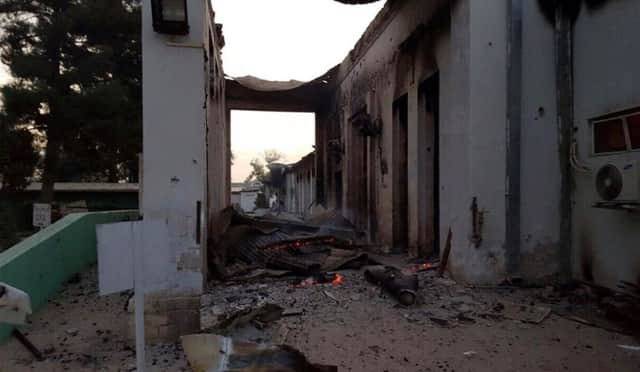Doctors leave Kunduz after hospital bombing


The humanitarian crisis in the city, which briefly fell to the Taleban last week before the government launched a counteroffensive, has grown increasingly dire, with shops shuttered because of ongoing fighting and roads made impassable by mines planted by insurgents. “All critical patients have been referred to other health facilities and no MSF staff are working in our hospital,” said Kate Stegeman, the communications manager for Doctors Without Borders, using the French acronym for the organisation.
“Some of our medical staff have gone to work in two hospitals where some of the wounded have been taken,” she added.
Advertisement
Hide AdAdvertisement
Hide AdInvestigations are continuing into the bombing of the hospital on Saturday, which killed at least 19 people, including 12 MSF staffers. The group blames a US airstrike. Afghan officials said helicopter gunships returned fire from Taleban fighters who were hiding in the facility.
Ms Stegeman said there were no insurgents in the facility at the time of the bombing. Video footage of the burned out compound in the east of Kunduz city shows automatic weapons, including rifles and at least one machine gun, on windowsills. President Ashraf Ghani has said a joint investigation is under way with US Forces. President Barack Obama said he expected a full account of the circumstances.
The Taleban seized Kunduz last Monday but have since withdrawn from much of the city in the face of a government counterattack. Sporadic battles continue as troops attempt to clear remaining pockets of militants.
The Taleban’s brief seizure of Kunduz marked the insurgent group’s biggest foray into a major urban area since the 2001 US-led invasion ended their rule.
Afghan forces have been struggling to combat the Taleban since the US and NATO shifted to a support and training role at the end of last year, officially ending their combat mission in the war-torn country. Militants blocked and mined roads as soon as they entered Kunduz to prevent people from leaving and to thwart the government’s assault.
The deputy head of the Afghan National Disaster Management Authority, Aslam Sayas, said he was aware of the growing needs of people trapped inside the city. “We are waiting for the security situation to improve to give us an opportunity to reach those needy people,” he said.
Saad Mukhar, the Kunduz provincial public health director, estimates that more than 70 people have been killed in the city since the fighting began.